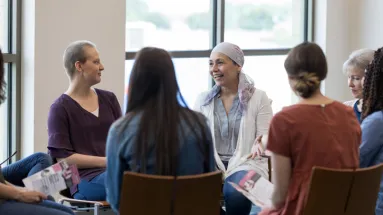Does Cancer Change Who You Are? Reflections On Identity.
Does Cancer Change Who You Are? Reflections On Identity.

Are you a different person now than you were before you were diagnosed with cancer?
It’s a complicated question. Our sense of identity is shaped by many factors. And, for some people, living with cancer can change how they see themselves.
As with so many things with cancer, how it affects your identity is deeply personal and specific to you. Some people may find strength and purpose on their cancer journey, while others may struggle with a sense of being defined by their cancer.
Your relationship with cancer may change over time. And only you can determine the ways that cancer affects your identity.
Below are a few things to know about cancer and identity, and some small actions called Microsteps. You may consider taking some of these steps to help you think about your relationship with cancer.
What to Know About Identity and Cancer
Cancer may alter your sense of self.
A cancer diagnosis is a major life event, so it’s no surprise that cancer can affect many aspects of your life. You might experience physical changes and complex emotions, for example.
Cancer can make you feel vulnerable, but it can also highlight your resilience and strength. It may prompt you to question thoughts or beliefs you’ve held about yourself, your life and your future.
Cancer can bring about a new normal.
Cancer may change important parts of your life. This could be anything from your relationships and career to your daily routines and future plans.
And it may challenge you in new ways. This might involve letting go of certain thoughts and ideas you had about yourself or your life, or finding new aspects of your identity.
Cancer may change how others treat you.
How other people see us can affect how we think about ourselves. And when you’re living with cancer, people may see and treat you differently to usual. Your loved ones and support network are going through lots of emotions too and these can come out in different ways.
For example, they might become impatient or angry at unexpected moments. They might talk about cancer when you don’t want to think about it and ask questions you don’t feel like answering, or they might have moments where they don’t know what to say.
Microsteps That May Help You Reflect on Your Identity
Here are some Microsteps to help you reflect on and embrace changes in your sense of self during your cancer journey. As always, consult with your care team if you have any questions or concerns about the topics covered in this article.
Staying in the calm “eye of the hurricane” by thinking about your core values.
As you come to terms with your diagnosis, try to take time to think about who you are and the values that define you. Reflecting on your values may help keep you grounded as you go through changes and uncertainty. If you’d like, you can write them down.
These values might include:
- Family and friends
- Helping others
- Taking care of yourself
- Learning and growing
- Being resilient
Maintaining habits that connect you to your values.
Keeping up with small daily habits may help you feel a sense of a sense of normality. Being active, keeping up with hobbies, and giving back to your community are all examples, and what matters is that you find an activity that means something to you.
Allowing yourself to feel down.
It’s normal to feel down sometimes. You might feel a sense of loss for your life before cancer. It may be helpful to give yourself the opportunity to feel all your emotions, without judgement.
Choosing words that you want to use.
Finding the words to say can be tricky. There may be certain words or phrases you use to describe yourself and your cancer, and certain words or phrases you avoid. Writing these down may help you remember these words.
Some people living with cancer like to use words like “fighter,” “battle,” and “survivor” — while others may not like these words. Some people are comfortable saying they are a “cancer patient,” while others aren’t. It’s up to you which words you want to use.
Creating your personal cancer narrative.
Your story belongs to you, and you have the right to tell it in your way. If it helps, try writing down key moments and milestones, so you can remember the important parts. You may find comfort in sharing your story with a loved one.
Embracing changes to your appearance.
If you’re coping with body changes, think about doing something for yourself that helps you come to terms with those changes and feel better about yourself. For example, sorting out your wardrobe, getting a new haircut or hair color, or taking a wig to a salon to style it just for you.
Taking on a new hobby.
Trying something new may bring you a fresh source of joy and satisfaction. It may also remind you that you can still learn, grow and have fun, even with cancer.
You may wish to try something you’ve always been curious about, whether it’s painting, music, or something active. Or, you may think about picking up a hobby you’ve done before and enjoyed — perhaps reading. Even spending a small amount of time on a new hobby could be a source of joy.
Celebrating milestones.
Consider looking for ways to celebrate milestones on your journey, no matter how small. Recognizing your progress can remind you how strong you are and how far you’ve come. You may choose to celebrate with loved ones, share an update on social media, or visit a special place.
Some people don’t feel like celebrating, and that’s OK. Everyone experiences, and copes with, cancer in different ways.
Developed with Thrive Global
![]()













